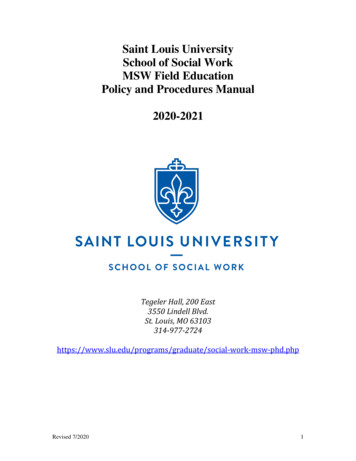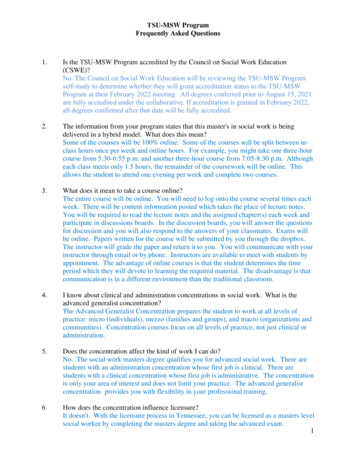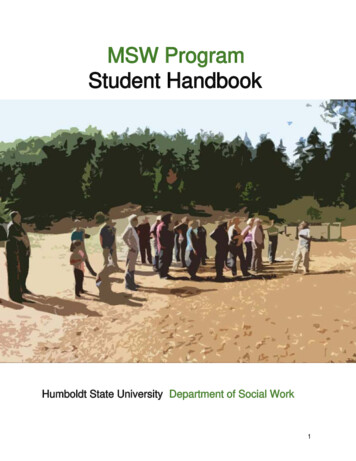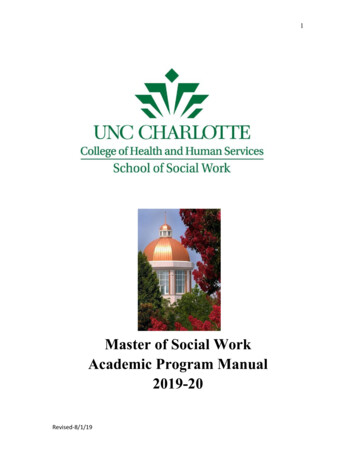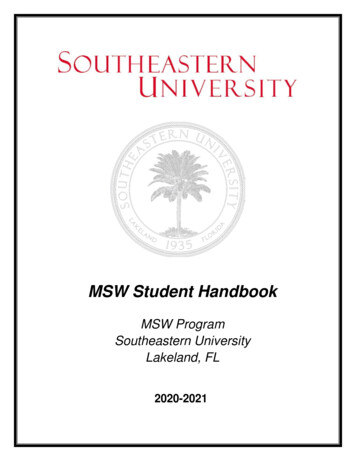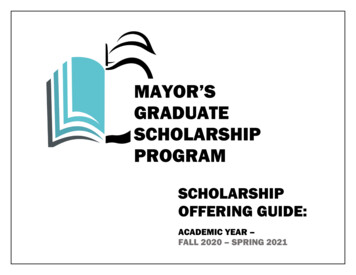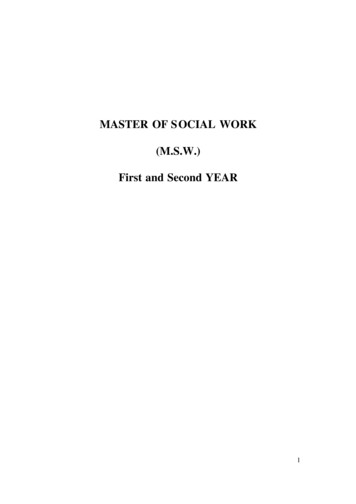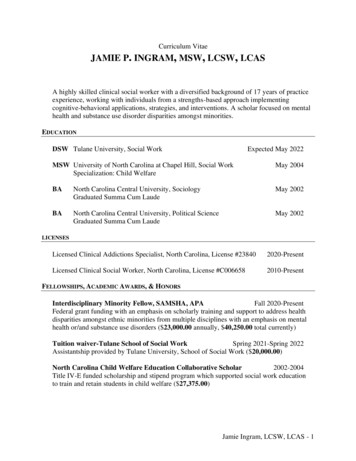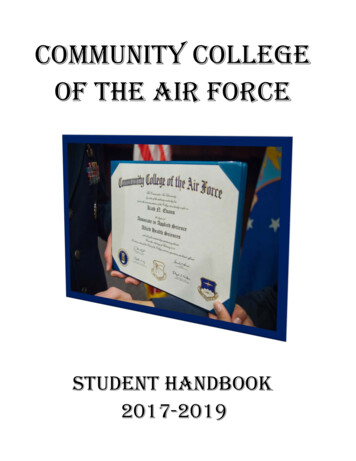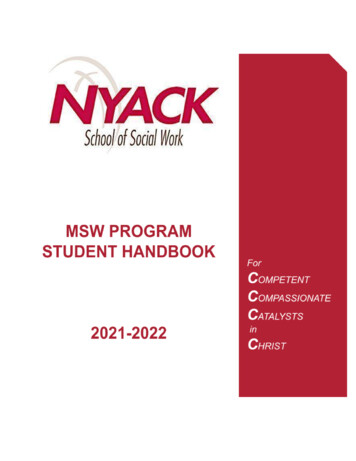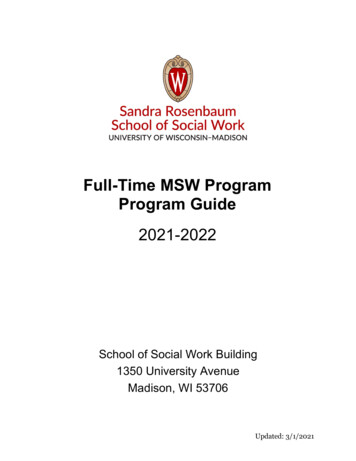
Transcription
Full-Time MSW ProgramProgram Guide2021-2022School of Social Work Building1350 University AvenueMadison, WI 53706Updated: 3/1/2021
Table of ContentsWelcome . 4MSW Program Mission & Goals . 4Program Mission . 4Program Goals . 4Professional School Behavior & Performance Expectations . 5Advising . 5Academic Advising . 5Common Reasons Why You May Want to See an Academic Advisor. 5Professional Advising . 6First Things First . 6Activate Your NetID . 6Activate Your UW-Madison E-mail Account . 6Social Work Information Management System (SWIMS) . 6Enroll in Courses . 7Obtain your Wiscard (UW-Madison Photo ID Card) . 7Curriculum . 7Generalist Practice Year (1st Year) . 7Advanced Generalist Specialization Year (2nd Year) . 8Advanced Generalization Specialization Focus Area and Subfocus Area . 8Field Education . 8How Courses are Offered. 9Attending Part-Time in the Full-Time MSW Program . 9Statistics, Exemptions, and Advanced Standing . 10Statistics Prerequisite Requirement. 10Advanced Standing for BSWs . 10Exemptions from Generalist Year Courses for Non-BSWs . 10Exemptions by Examination (BSWs and Non-BSWs) . 11Summer Bridge Term . 11Social Work Competencies . 12Student Involvement & Student Organizations . 12Grading . 122
Satisfactory Progress Criteria . 13Probation Policy. 14Withdrawal from UW-Madison . 14Access and Accommodations in Instruction for Students with Disabilities . 14Career Development Series . 15Professional Social Work Credentials & Continuing Education . 16School Communication Mechanisms . 16WiscList (email distribution lists) . 16Social Media: Facebook, Twitter, Instagram, and YouTube. 163
WelcomeWelcome to the Full-Time MSW Program at UW-Madison Sandra Rosenbaum School ofSocial Work! We are pleased you chose our program. The information provided in thisGuide will help ensure that you have a successful academic year.MSW Program Mission & GoalsProgram MissionGuided by the core values of the social work profession and grounded in the advancedgeneralist practice framework, the MSW program mission is to provide social workeducation that will nurture competent, ethical autonomous social work professionalscommitted to scientific inquiry, evidence-based practice, respect for human diversity,the promotion of human and community well-being, human rights, and social,economic and environmental justice.We aim to cultivate skilled social work professionals and social change leaders capableof creating and advancing knowledge and addressing complex pressing social problemsvia multimethod and multilevel approaches.Program GoalsDerived from the MSW program mission and context, the program goals are to: Provide an MSW curriculum that builds on a liberal arts base, grounded in aperson-in-environment, empowerment, and strengths perspective that promotesthe values, ethics, and purposes of the profession. Prepare students for generalist and autonomous advanced generalist practicethat is transferable across diverse contexts, locations, and problems by providingknowledge, values, and skills training regarding: oPopulations and related social problems/issues;oSocial, health, and/or human services systems and policies;oSystems of oppression, privilege, and power;oMultilevel and multimethod approaches based on scientific inquiry andbest practices;oEthical advocacy and social, economic, and environmental justice;oReflective leadership;oResearch informed practice, and practice and program evaluation methodsthat contribute to the profession’s knowledge base.Develop and maintain an inclusive environment that will attract, nurture, andsupport diversity within the School, among students, faculty, and staff.4
Cultivate and maintain partnerships with a variety of social, health and/orhuman service organizations to provide meaningful field experiences andsupervision while respecting and contributing to their respective mission.Professional School Behavior & Performance ExpectationsThe MSW is an advanced professional degree. Social work professionals adhere to theNASW Code of Ethics in all aspects of practice. As persons preparing for professionalpractice, you will find that adherence to the Code begins now and continues throughoutyour educational experience. We expect our students to comply with standards throughappropriate professional behavior and demeanor in classroom settings, field placementsettings, in group meetings; and in interactions with faculty, instructors, advisors, andstaff and with each other. Additional information pertaining to professional andrespectful behavior is found on the School’s Professional Programs (MSW & BSW)Students’ Rights and Responsibilities site.AdvisingThe Sandra Rosenbaum School of Social Work offers students both academic andprofessional advising. Two professional social work advisors are assigned to andresponsible for advising all of the MSW students in our program. MSW students do nothave individual faculty advisors. However, faculty are great resources relative toprofessional social work concerns in their areas of expertise.Academic AdvisingHannah Klusendorf and Belinda Velazquez are academic advisors for all professionalprogram students. They assist students with tracking academic requirements,understanding academic policies and procedures, and with matters students mayencounter that impede academic progress. We encourage students to meet with eitherAcademic Advisor at least once a semester: Belinda Velazquez, MSSW: 323 Sandra Rosenbaum School of Social Work,263-3660, bvelazqu@wisc.eduHannah Klusendorf, MSW: 325 Sandra Rosenbaum School of Social Work,263-3660, hklusendorf@wisc.eduIn-person or phone appointments can be made via the Sandra Rosenbaum School ofSocial Work’s Advising Appointments website or by calling the main office at 608-2633660.Common Reasons Why You May Want to See an Academic Advisor Assist with course selectionDiscuss alternatives within the programProvide referral and support services for individual student needsAssist with career resourcesGuide Advanced Generalist Specialization students who want to select a focusarea5
Clarify School Social Work and Graduate School policies and procedures Offer guidance regarding Certification and Licensure in WisconsinProfessional AdvisingFaculty (field faculty, focus area chairs, classroom faculty and agency supervisors)through classroom and field experiences contribute to students’ professional advisementrelative to knowledge and skills in areas of study or fields of practice and professionalpractice roles. Faculty are a great resource for careers in social work related to theirfields of expertise.First Things FirstActivate Your NetIDThe Graduate School and the Sandra Rosenbaum School of Social Work require you toactivate your Net ID. You will need your 10-digit student campus ID number provided inyour Graduate School acceptance letter. The NetID and password, are needed to accessmany campus applications and services, including “MyUW,” Web Enrollment, andOffice 365 for email. For assistance with activating your NetID, go to the UW KnowledgeBase (NetID – Activating Your Account) or contact the DoIT Help Desk (608-264-4357or help@doit.wisc.edu).NOTE: You need to activate your NetID before you activate your email account.Activate Your UW-Madison E-mail AccountThe UW issues a free email account for use throughout the time a student is enrolled forclasses at the University. The UW email account is the mechanism for formalcommunication between university faculty and staff with students. If you are a newstudent at the University of Wisconsin-Madison, you set up your email account afterenrolling in courses.You activate your account from the My NetID link in MyUW. More information can befound on the UW Knowledge Base (NetID – Modifying your account).NOTE: If you were enrolled in a class or completing your degree at UW-Madison inthe most recent spring term, your wisc.edu email account is active and you do notcreate a new account.Social Work Information Management System (SWIMS)The admissions letter and checklist sent to you by advisors directs students to submitcritical documents to the School through SWIMS (use the links in the email, or go tohttps://gate.socwork.wisc.edu): NASW Code of EthicsSchool of Social Work Plagiarism PolicyDuty to Disclose and Consent to Release of InformationStudent Rights & Responsibilities6
Exemption Declaration FormField Preference FormFull-Time Confirmation Response FormPlease follow instructions and timelines for completing each item.Enroll in CoursesNew MSW students enroll beginning in early July 2021 for Fall classes. In your StudentCenter (found in MyUW) you will receive an invitation to enroll from the Office of theRegistrar along with your assigned “Earliest Appointment Time”. Enrollmentinformation is available on the Office of the Registrar’s Enrollment Information websiteas well as Course Search & Enroll. Russ Portier (portier@wisc.edu) is the enrollmentmanager for the School of Social Work, and is happy to help students with enrollmentissues not related to advising.Obtain your Wiscard (UW-Madison Photo ID Card)Wiscard is your official UW-Madison identification card and you obtain it at theWiscard Office. It provides access to libraries, recreation facilities and other campusservices. It is also a campus-wide debit card program, which turns your University IDinto a debit card.CurriculumThe MSW Program curriculum is outlined below. Courses are taken sequentially. Mostcourses are only offered once per academic year. The Generalist Practice Year coursesmust be completed before the Advanced Generalist Specialization Year courses aretaken. Advanced Generalist Specialization courses are taken concurrently withAdvanced Practice Field & Integrative Seminar (SW 800/801). See the Full-Time MSWSpecialization Handbook (found on the Social Work Student Resources site) for courseofferings for Fall and Spring semesters.Generalist Practice Year (1st Year)Fall SemesterCredSpring SemesterCredSW605Field of Social Work2SW606Social Policy2SW711Human Behavior & theEnvironment2SW710Diversity, Oppression and SocialJustice in Social Work2SW441Generalist Practice withIndiv., Families, and Groups3SW650Social Work Research Methods3SW442Generalist Practice withCommunities and Orgs2SW612Psychopathology in GeneralistPractice2SW400Field & Integrative Seminar I4SW401Field & Integrative Seminar II41313Generalist Practice Year courses are only available in the semesters listed.7
Advanced Generalist Specialization Year (2nd Year)Fall SemesterCredSpring SemesterCredSW840Advanced Macro Practice orFree Elective *2-3SW840Advanced Macro Practice or FreeElective *2-3Advanced Practice Course **2Free Elective2-3Policies and Services Course**2Free Elective2-3Field & Integrative SeminarIII5Field & Integrative Seminar IV6SW800SW80111-121215* Free electives and macro practice may be taken in either semester. Electives may be taken inside or outside theSchool. Advanced Macro is 2 credits, electives may be 2 or 3 credits depending on the course.** Only offered in fall semester, except Mental Health Policy and Services (SW836) which is only offered in springAdvanced Generalization Specialization Focus Area and SubfocusAreaThe School offers students the option to pursue an area of focus in the AdvancedGeneralist Specialization year of the program. They may also choose to pursue a subfocus within their chosen focus area. More information about focus areas and sub-focusareas can be found in the Full-Time MSW Specialization Handbook (found on the SocialWork Student Resources site).Field EducationThe Sandra Rosenbaum School of Social Work offers 12-13 field units with placementsin over 100 agencies throughout Dane County and its contiguous counties. Occasionallythere are opportunities for placements in other parts of the state (this option requiresconsultation with the Field Director). Field units and their associated placements runthe gamut of social work venues of practice and cross a variety of system types and sizes.Generalist YearGeneralist year field placements are 256 hours persemester, including a 2.5-hour weekly seminar. Timein field placement averages 15-16 hours per week.Specialization YearSpecialization year field placements are 320 hoursper semester, including a 2.5-hour weekly seminar.Time in field placement averages 20-21 hours perweek.Generally, Mondays, Wednesdays, and Fridays are reserved for field placement hoursand field seminar. This means that classroom courses are held on Tuesdays andThursdays. Field does not take precedence over Tuesday and Thursday classes.8
For complete details about the field program and how it operates, please refer to theFull-Time MSW Field Handbook (found on the Social Work Student Resources site).How Courses are OfferedMost courses meet once a week (two hours) on Tuesday or Thursday. Generally,Monday, Wednesday, and Friday are reserved for field placement hours and seminar.Courses like 605, 606, 650 and 711 are larger lecture-type courses. Some coursesprovide TA or lab sections of approximately 20 students per lab. DiscussionSections/Labs are generally scheduled on Mondays or Wednesdays. Most electivecourses are seminar style with 25-30 students. Courses are usually offered only once ayear. Refer to the Full-Time MSW Specialization Handbook (found on the Social WorkStudent Resources site) for elective and advanced level courses offered this academicyear.Attending Part-Time in the Full-Time MSW ProgramAttending the Full-Time MSW Program on part-time basis requires that students plantheir course of study with an Advisor. Students must enroll in courses according to prerequisites and proper coursesequencing.A minimum of two courses each semester (4 credits) is required.The required credit load in years 2 & 4 (illustrated below) is a full-time creditload.Any exceptions to these policies must be discussed ahead of time with an Advisor.Consult with an Advisor before enrolling for courses each semester.Part-Time Curriculum SequenceFall Semester, Year 1Spring Semester, Year 1SW 605SW711SW606SW710Fall Semester, Year 2Spring Semester, Year 2SW400SW441SW442SW401SW612SW650Fall Semester, Year 3Spring Semester, Year 3Policy & ServicesElectiveElectiveElectiveFall Semester, Year 4Spring Semester, Year 4SW800Advanced Practice CourseSW801SW8409
Statistics, Exemptions, and Advanced StandingDecisions about exemptions are made by faculty based on information provided on theExemption Declaration Form (in SWIMS) or through passage of exemption exam(s).When a course is evaluated as equivalent or a student passes an exemption exam, thestudent receives the exemption which means you do not need to take the course, nor doyou have to “make up” the credits.Statistics Prerequisite RequirementIncoming MSW students are required to have completed an approved statistics coursebefore starting the program in the fall. To be approved for exemption, the statisticscourse should meet the following criteria: Course topics that must be covered: distributions, measures of central tendency,dispersion and shape, the normal distribution, experiments to compare means,standard errors, confidence intervals, effects of departure from assumptions,method of least squares, regression, correlation assumptions and limitations,basic ideas of experimental design.The statistics course must have been completed within the past five years (fromacademic year of graduation to academic year of enrollment in our MSWProgram).A grade of C or better is required (no C- or CD).A syllabus from the semester you took the statistics course should accompany theExemption Declaration Form (found in SWIMS) unless your course is listed on theSocial Work/Social Welfare Course Equivalencies information. If you have not yetcompleted the statistics prerequisite, we are offering SW 705 Statistics for Social Workin the Summer Bridge Term.Advanced Standing for BSWsIf you have a BSW from a CSWE (Council on Social Work Education) accredited Schoolof Social Work, you may qualify for “Advanced Standing” in our MSW Program. Followthe instructions and the information found with the Exemption Declaration Form foundin SWIMS.Advanced standing is a status given to incoming MSW students based on having earneda BSW in a CSWE accredited program within the past five years (from academic year ofgraduation to academic year of enrollment in our MSW Program). In addition, BSWstudents must have earned grades of B or better in their comparable generalist courses.Full Advanced Standing means that the incoming MSW student has exempted out of allGeneralist Practice (1st year) courses.Exemptions from Generalist Year Courses for Non-BSWsExemptions out of generalist year courses for non-BSW students may be given to: Students who have completed one or more comparable generalist courses in anaccredited BSW program with a grade of B or better (no older than five years10
from academic year of graduation to academic year of enrollment in our MSWProgram).Students with a BA/BS with Social Welfare major from UW-Madison (no olderthan five years from academic year of graduation to academic year of enrollmentin our MSW Program) who obtained a grade of B or better in one or all of thefollowing courses: 205, 206, 457, 640, 650, will exempt from those courseswithout examination.Students who have completed one or more comparable generalist courses in asocial science program with a grade of B or better.Exemptions by Examination (BSWs and Non-BSWs)Exemption exams are taken by: Students whose BSW is more than five years old (from academic year ofgraduation to academic year of enrollment in our MSW Program)UW-Madison Social Welfare majors whose graduation date is more than fiveyears old (from academic year of graduation to academic year of enrollment inour MSW Program)Students who did not attain a grade of “B” or better in their social work coursesor did not attain a grade of “C” or better in statistics.For those interested in testing out of a class, exemption exams are offered the weekbefore classes begin each semester. Not all exams are offered every semester. See theSchool’s Exemption Process page for more details and exam schedules.Summer Bridge TermIf you: Have not taken a generalist course in psychopathology; OR,Have not passed one or more generalist courses with a grade of “B” or better toqualify for full Advanced Standing; AND/OR,You have not taken or completed an approved Statistics course with a grade of“C” or betterThen, you should take these courses, if offered, in the Summer Bridge Term prior tostarting the program in the fall. Summer 2021 course offerings include: Psychopathology for Generalist Social Work Practice (SW612)Basic Statistics for Social Work (SW705) 1Methods of Social Work Research (SW650)If it is not possible to take Statistics through the School, you may take any statistics class that covers allthe courses topics listed in the above Statistics Prerequisite Requirement.111
Social Work CompetenciesThe curriculum is designed to prepare MSW students as autonomous practitioners withthe ability to integrate social work knowledge, skills and values, affective and cognitiveprocesses that promote well-being at the individual, family, group, organization andcommunity level. To achieve these aims, the curriculum is built around nine corecompetencies listed below:1.2.3.4.5.6.7.8.9.Demonstrate Ethical and Professional BehaviorEngage Diversity and Difference in PracticeAdvance Human Rights and Social, Economic, and Environmental JusticeEngage in Practice-Informed Research and Research-Informed PracticeEngage in Policy PracticeEngage with Individuals, Families, Groups, Organizations, and CommunitiesAssess Individuals, Families, Groups, Organizations, and CommunitiesIntervene with Individuals, Families, Groups, Organizations, and CommunitiesEvaluate Practice with Individuals, Families, Groups, Organizations, andCommunitiesStudent Involvement & Student OrganizationsSandra Rosenbaum School of Social Work students are invited to join social work orUW-Madison student organizations, organize their own student organizations (visitthe Center for Leadership and Involvement for more information), and to join standingcommittees of the Sandra Rosenbaum School of Social Work. More information aboutactive social work student organizations can be found on the School’s StudentInvolvement page, along with information about School of Social Work committees andhow to get involved.GradingBelow is a grading scale used by many social work instructors for classroom courses.Field course instructors use a similar scale.PointsGradeCriteria94-100AOutstanding, surpassesrequirements in all areas88-93A/BSurpasses requirementsin many areas82-87BMeets requirements in allareas76-81B/CMeets requirements insome areas, below inothers70-75CBelow requirements inmost areas, not acceptablegraduate work12
64-69DBelow requirements in allareas, not acceptablegraduate work 63FFails to meet minimalrequirements in all areas,not acceptable graduateworkOther grades that students may receive but are excluded from the GPA calculation are: S or U (Satisfactory or Unsatisfactory) in courses taken on the Pass/Fail basis Cr or N (Credit or No Credit) in courses offered on a Credit/No Credit basis DR (Dropped), indicates the course was dropped. I (IN for Cr/N Courses) (Incomplete), a temporary grade used when work is notcompleted during a term. EI (Extended Incomplete), a temporary grade for an extended time limit toremove an Incomplete. PI (Permanent Incomplete), a permanent grade replacing an Incomplete incurredin a student's last semester in residence and not removed within five years. NR (No Report), indicates that a grade was not submitted by the instructor. Hasno net effect on GPA. NW (No Work)."should be used for students who enroll in a course and thennever attend. 'No Work' in this context means that the instructor has no evidencethat the student ever attended, in that no course work was ever submitted. Anystudent who does attend for part of the semester, and then stops participatingshould be given a grade of 'F' unless there are grounds for assignment of a gradeof 'I'(Incomplete)." P (Progress), a temporary grade used for courses extending beyond one term. Thefinal grade determines the grade for each term and replaces P grades for thecourse. Q (Question on Credits), a temporary grade used during grade reporting toindicate a credit problem. A Q grade may be represented on a grade report as "?." W (Withdrew) indicates the student withdrew from the University while enrolledin the course. Audited courses, denoted as such by 'AU' in place of a number of credits, aregraded either S (Satisfactory) or NR (No Report).Satisfactory Progress CriteriaGraduate students are required to maintain and graduate with a cumulative GPA of3.00.13
Grades of “C” are accepted only if offset by an equal number of credits of grades of A.Students who receive more than two grades of C or a grade of D or F will be droppedfrom the MSW Program. (This policy does not apply to grades received for coursestaken to meet the Statistic prerequisite while in the program but will affect the GPA).Students who receive a grade of C in the Field and Integrative Seminar courses maycontinue only with permission of the faculty and may not offset the grade with a grade ofA. Refer to the Field Education Handbook (found on the Social Work Student Resourcessite) for more details about grades in Field.Probation PolicyIn any give semester in which the GPA falls below 3.0 the Graduate School will place youon probation. The Graduate School regularly reviews the record of any student whoearned grades of BC, C, D, F, or Incomplete in a graduate course (300 or above), orgrade of U in research credits. This review could result in academic probation with ahold on future enrollment or in being suspended from the Graduate School.Withdrawal from UW-MadisonStudents may need to withdraw from the program for a variety of reasons. Withdrawalindicates that a student intends to stop attending classes for the current semester.Submission of a withdrawal request in MyUW Student Center is required between thefirst and last day of the semester, when a student wishes to drop all classes in which heor she is enrolled for the current semester. The electronic withdrawal process will notrequire submission of a signed paper form. Instead, students will submit withdrawalrequests via MyUW Student Center, and the requests are then routed electronically tothe Graduate School for review. Approval from the Graduate School, as well as from theOffice of International Student Services for students on J-1 and F-1 visas, is requiredbefore a graduate student is formally withdrawn from the semester. For moreinformation see Withdraw from UW-Madison, or Cancel Your Enrollment on the Officeof the Registrar’s website.Students who withdraw from the full-time MSW program without having completed atleast 8 credits must reapply for admission to the program.Access and Accommodations in Instruction for Studentswith DisabilitiesThe University of Wisconsin-Madison and the Sandra Rosenbaum School of SocialWork are committed to providing an accessible, accommodating and supportiveteaching and learning environment. The University has programs, resources andpolicies designed to assist students with disabilities to be successful in their education.The place to start is the McBurney Disability Resource Center.14
Career Development SeriesThe Sandra Rosenbaum School of Social Work often provides to our MSW programstudents opportunities to prepare for the professional work environment.Faculty, instructors, former students and community practitioners present on topicsdrawn from recent research, new practice techniques, certification and licensingrequirements, and preparing for a career in social work. Sometimes the topic is aboutthe use of technology in the practice or social work or how to take constructive feedback.Instruction may be delivered via lecture, seminar, workshop, mentoring, andbook/journal article discussion.Examples of previous offerings: Focus Area Information Sessions: Aging Child, Youth, and Family Welfare Health Mental Health Mindfulness Meditation for Stress Reduction Wisconsin Certification /Licensure: Beginning the Process Joining Professional Social Work Membership Organizations: The Benefits toStudents as They Transition from Student to Social Worker Mindfulness: Self Awareness & Self Care in Social Work The Social Work Job Search Resume Writing Cover Letter Writing Job Interviewing Compensation NegotiationStudents are encouraged to meet individually with an advisor or faculty in their areas ofexpertise to discuss career related issues. The College of L&S Suc
We are pleased you chose our program. The information provided in this Guide will help ensure that you have a successful academic year. MSW Program Mission & Goals Program Mission Guided by the core values of the social work profession and grounded in the advanced generalist practice framework, the MSW program mission is to provide social work
